2017人教版高中英语必修五Unit1Greatscientistsword单元练习
高中英语Unit 1 Great scientists 人教版必修五
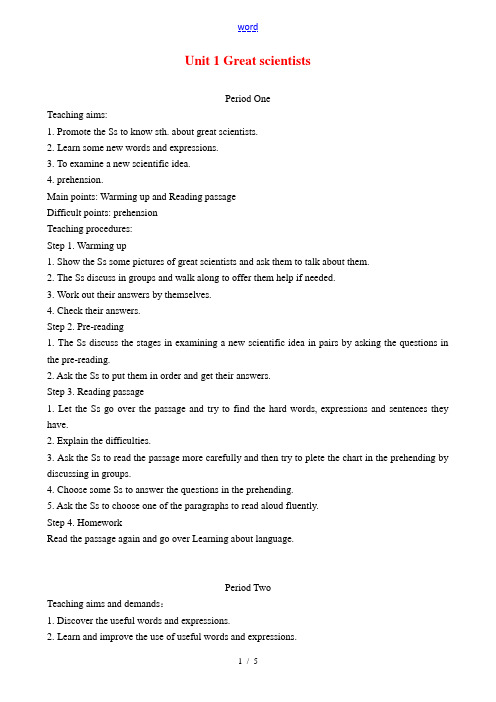
Unit 1 Great scientistsPeriod OneTeaching aims:1. Promote the Ss to know sth. about great scientists.2. Learn some new words and expressions.3. To examine a new scientific idea.4. prehension.Main points: Warming up and Reading passageDifficult points: prehensionTeaching procedures:Step 1. Warming up1. Show the Ss some pictures of great scientists and ask them to talk about them.2. The Ss discuss in groups and walk along to offer them help if needed.3. Work out their answers by themselves.4. Check their answers.Step 2. Pre-reading1. The Ss discuss the stages in examining a new scientific idea in pairs by asking the questions in the pre-reading.2. Ask the Ss to put them in order and get their answers.Step 3. Reading passage1. Let the Ss go over the passage and try to find the hard words, expressions and sentences they have.2. Explain the difficulties.3. Ask the Ss to read the passage more carefully and then try to plete the chart in the prehending by discussing in groups.4. Choose some Ss to answer the questions in the prehending.5. Ask the Ss to choose one of the paragraphs to read aloud fluently.Step 4. HomeworkRead the passage again and go over Learning about language.Period TwoTeaching aims and demands:1. Discover the useful words and expressions.2. Learn and improve the use of useful words and expressions.Main points: Learn to use the words and expressions that the Ss discover.Difficult points: Improve the use of the words and expressions.Teaching procedures:Step 1. Learning about language1. Discover the useful words and expressions in this unit in groups of four.2. Ask the Ss to show their results to the class.3. Ask them to study the words and expressions in Ex.1.4. Ss have a discussion and do the exercises.5. Check their answers.6. Change the verbs into nouns and make sentences by using “make a …〞Step 2. Using words and expressions1. Make sure the Ss know the words and expressions.2. Let the Ss work in groups to plete the blank in Ex.1.3. Check their answers.4. Do the translations. Ss discuss the sentences and the translate them into English, using the words and phrases in brackets.Step 3. Words learning1. Show the Ss a list of prefixes to talk about them.2. Ask them to work in groups to find some words with the prefixes and study their meanings.3. Let them show their results to the class.4. Walk around the class to give them help if needed.Step 4. Study the use and meanings of suggest1. Study the meaning of suggest by looking the dictionary entry.2. Match the meanings with the sentences on the right in Ex.4.3. Check their answers.Step 5. HomeworkTeaching aims and demands:1. Discover the useful structure.2. Learn to use the grammar of past participle.3. Enable the Ss understand the past participle using as attribute and predicative.Main points: Learn the usage of the past participle using as attribute and predicative.Difficult points: Use the useful structure.Teaching procedures:Step 1. RevisionReview the past participle of some verbs.Step 2.1. Look at the chart and study the phrases.Past participle as the attribute and the predicative(1) terrified people(2) reserved seats(3) polluted water(4) a crowded room(5) a pleased winner(6) children who look astonished(7) a vase that is broken(8) a door that is closed(9) the audience who feel tired(10) an animal that is trapped3. Ask the Ss the following questions:(1) What kind of words before the past participles?(2) What kind of words after the past participles?4. Ask the Ss find the sentences using the past participle in the reading passage.5. Ss have a discussion and plete the chart with the same meaning of the phrases above.6. Ss show their results to the class.7. plete the sentences in Ex.3.Step 3. Using structure1. Make sure the Ss know the words and the discuss in groups to finish the sentences using past participle.(Ex.1)2. Rewrite the sentences into one sentence using the past participle as the attribute or predicative.3. Check their answers.Step 4. HomeworkWrite down 1, 3, 5, 7 of Ex.2 in the exercise book.Period FourTeaching aims and demands:1. Improve the Ss listening skills.2. Know more about great scientists.Main points: Listening and speakingDifficult points: Get to know the information of listening materials.Teaching procedures:Step 1. Listening and speaking1. Listen to the tape and answer the questions.(1) What did Qian Xuesen study first?(2) What experience did he get in America that was very useful for China?(3) What was Qian Xuesen’s achievement when he returned to China from America?(4) How has he been honoured in China?(5) How did Steve honour him?Step 2. Speaking1. Ss discuss what scientific job they will do in the future in pairs by using the questions and expressions on Page 6.2. Ask some Ss to talk in class.Step 3. Listening and talking1. Play the tape for the Ss to listen and finish the exercises in the workbook, pause from time to time if needed.2. Check their answers.3. Work in pairs. Imagine you are going to meet a specialist about a newly-found flower by using the useful sentences on Page 42.Step 4. Listening task1. Play the tape for the Ss to get the information of the listening task.2. Check their answers.Step 5. HomeworkPrepare the reading task.Period FiveTeaching aims and demands:Improve the Ss reading skills and their talent in getting the information.Main points: Reading and reading taskDifficult points: Finding the Euler path.Teaching procedures:Step 1. RevisionRevise the past participle used as the attribute and predicative.Step 2. Reading1. Ss read the passage as fast as they can and then draw the two theories of the universe in groups.2. Ask the Ss to show their pictures to the class.3. Ss read the passage again and find the problems they have.4. Solve the Ss’ problems.5. Discuss in pairs. If you were Nicolaus Copernicus, would you have hidden your theory for so many years? Why?6. Choose some Ss to share their ideas to the class.Step 3. Reading task1. Ss read the passage and answer the following questions.(1) What is odd point? (2) What is even point? (3) What rule did Euler find?2. Ss discuss in groups and try to find the answers.3. Teacher walks around to offer them help.4. Use the rule to see if you can go over the diagram, not missing any points or going over any line twice.( See figures on Page 46)5. Ss work in groups.Step 4. HomeworkWrite a short passage about Copernicus.Period SixTeaching aims and demands:1. Try to write sth persuasive.2. Learn to write a report about people.Main points:Make a plan in discussion.Difficult points:Write a passage / a report.Teaching procedures:Step 1. Writing1.Ask the Ss to read the passage again and gather some information about Copernicus.2. Plan to write a letter.Step 2. Writing taskWrite a report about your scientist, his/her life, achievements and the key to his/her success.1. Before you begin to write, remember to put your information under three headings: life, achievements and key to success.2. Plan your report like the one on P47.3. Ask them to read their plans.4. Begin to write the report.Step 3. Homeworkplete the report and write down on the exercise book.。
人教版高中英语必修五Unit 1 Great Scientists.docx
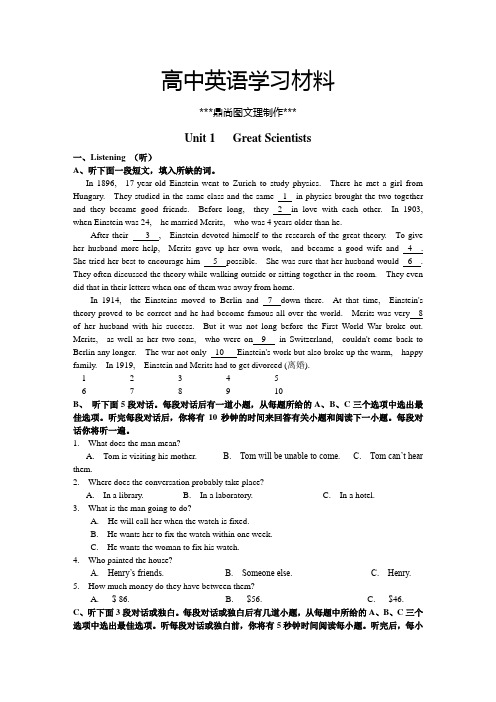
高中英语学习材料***鼎尚图文理制作***Unit 1 Great Scientists一、Listening (听)A、听下面一段短文,填入所缺的词。
In 1896, 17-year-old Einstein went to Zurich to study physics. There he met a girl from Hungary. They studied in the same class and the same 1 in physics brought the two together and they became good friends. Before long, they 2 in love with each other. In 1903, when Einstein was 24, he married Merits, who was 4 years older than he.After their 3 , Einstein devoted himself to the research of the great theory. To give her husband more help, Merits gave up her own work, and became a good wife and 4 . She tried her best to encourage him 5 possible. She was sure that her husband would 6 . They often discussed the theory while walking outside or sitting together in the room. They even did that in their letters when one of them was away from home.In 1914, the Einsteins moved to Berlin and 7 down there. At that time, Einstein's theory proved to be correct and he had become famous all over the world. Merits was very 8 of her husband with his success. But it was not long before the First World War broke out. Merits, as well as her two sons, who were on 9 in Switzerland, couldn't come back to Berlin any longer. The war not only 10 Einstein's work but also broke up the warm, happy family. In 1919, Einstein and Merits had to get divorced (离婚).1_______ 2_______ 3_______ 4_______ 5_______6_______ 7_______ 8_______ 9_______ 10______B、听下面5段对话。
高中英语Unit1 Great scientists文章 哥白尼人教版必修五
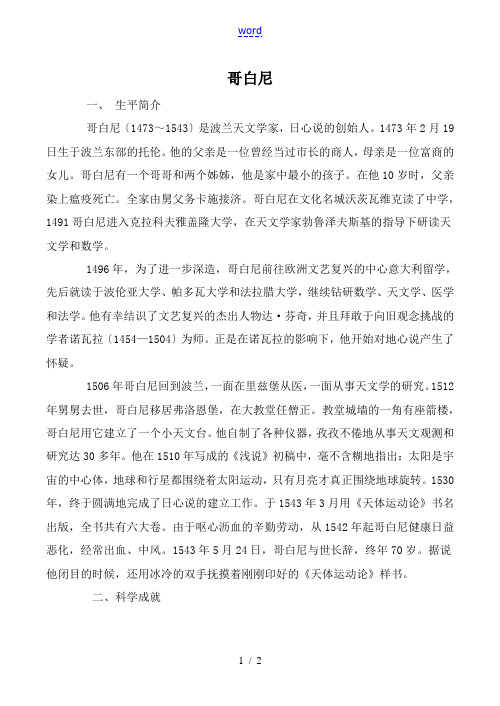
哥白尼一、生平简介哥白尼〔1473~1543〕是波兰天文学家,日心说的创始人。
1473年2月19日生于波兰东部的托伦。
他的父亲是一位曾经当过市长的商人,母亲是一位富商的女儿。
哥白尼有一个哥哥和两个姊姊,他是家中最小的孩子。
在他10岁时,父亲染上瘟疫死亡。
全家由舅父务卡施接济。
哥白尼在文化名城沃茨瓦维克读了中学,1491哥白尼进入克拉科夫雅盖隆大学,在天文学家勃鲁泽夫斯基的指导下研读天文学和数学。
1496年,为了进一步深造,哥白尼前往欧洲文艺复兴的中心意大利留学,先后就读于波伦亚大学、帕多瓦大学和法拉腊大学,继续钻研数学、天文学、医学和法学。
他有幸结识了文艺复兴的杰出人物达·芬奇,并且拜敢于向旧观念挑战的学者诺瓦拉〔1454—1504〕为师。
正是在诺瓦拉的影响下,他开始对地心说产生了怀疑。
1506年哥白尼回到波兰,一面在里兹堡从医,一面从事天文学的研究。
1512年舅舅去世,哥白尼移居弗洛恩堡,在大教堂任僧正。
教堂城墙的一角有座箭楼,哥白尼用它建立了一个小天文台。
他自制了各种仪器,孜孜不倦地从事天文观测和研究达30多年。
他在1510年写成的《浅说》初稿中,毫不含糊地指出:太阳是宇宙的中心体,地球和行星都围绕着太阳运动,只有月亮才真正围绕地球旋转。
1530年,终于圆满地完成了日心说的建立工作。
于1543年3月用《天体运动论》书名出版,全书共有六大卷。
由于呕心沥血的辛勤劳动,从1542年起哥白尼健康日益恶化,经常出血、中风。
1543年5月24日,哥白尼与世长辞,终年70岁。
据说他闭目的时候,还用冰冷的双手抚摸着刚刚印好的《天体运动论》样书。
二、科学成就哥白尼在科学上最大的成就是创立了以太阳为中心的地动学说〔日心说〕,否定了在西方统治达一千多年的以地球为中心的地静学说〔地心说〕。
哥白尼创立的日心说,即名著《天体运行论》的发表,不但是天文学上的一次伟大革命,推动了天文学研究的飞速发展,而且引起了人类宇宙观的重大革新,沉重地打击了封建神权的统治,“从此自然科学便开始从神学中解放出来〞三、趣闻轶事1.人小志大哥白尼从小受到良好的学校教育,喜欢观察天象。
高中英语Unit1 Great scientists文章 哥白尼与日心说人教版必修五
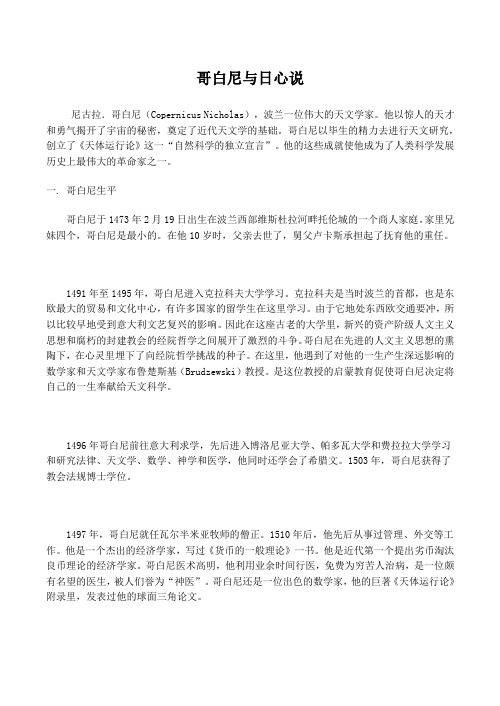
哥白尼与日心说尼古拉.哥白尼(Copernicus Nicholas),波兰一位伟大的天文学家。
他以惊人的天才和勇气揭开了宇宙的秘密,奠定了近代天文学的基础。
哥白尼以毕生的精力去进行天文研究,创立了《天体运行论》这一“自然科学的独立宣言”。
他的这些成就使他成为了人类科学发展历史上最伟大的革命家之一。
一. 哥白尼生平哥白尼于1473年2月19日出生在波兰西部维斯杜拉河畔托伦城的一个商人家庭。
家里兄妹四个,哥白尼是最小的。
在他10岁时,父亲去世了,舅父卢卡斯承担起了抚育他的重任。
1491年至1495年,哥白尼进入克拉科夫大学学习。
克拉科夫是当时波兰的首都,也是东欧最大的贸易和文化中心,有许多国家的留学生在这里学习。
由于它地处东西欧交通要冲,所以比较早地受到意大利文艺复兴的影响。
因此在这座古老的大学里,新兴的资产阶级人文主义思想和腐朽的封建教会的经院哲学之间展开了激烈的斗争。
哥白尼在先进的人文主义思想的熏陶下,在心灵里埋下了向经院哲学挑战的种子。
在这里,他遇到了对他的一生产生深远影响的数学家和天文学家布鲁楚斯基(Brudzewski)教授。
是这位教授的启蒙教育促使哥白尼决定将自己的一生奉献给天文科学。
1496年哥白尼前往意大利求学,先后进入博洛尼亚大学、帕多瓦大学和费拉拉大学学习和研究法律、天文学、数学、神学和医学,他同时还学会了希腊文。
1503年,哥白尼获得了教会法规博士学位。
1497年,哥白尼就任瓦尔半米亚牧师的僧正。
1510年后,他先后从事过管理、外交等工作。
他是一个杰出的经济学家,写过《货币的一般理论》一书。
他是近代第一个提出劣币淘汰良币理论的经济学家。
哥白尼医术高明,他利用业余时间行医,免费为穷苦人治病,是一位颇有名望的医生,被人们誉为“神医”。
哥白尼还是一位出色的数学家,他的巨著《天体运行论》附录里,发表过他的球面三角论文。
哥白尼也是一位伟大的爱国主义者,当条顿骑士团疯狂侵略波兰时,他挺身而出,起来保卫自己的祖国。
高中英语 人教版新课标必修五unit 1 Great Scientists词汇 课件(共38张)
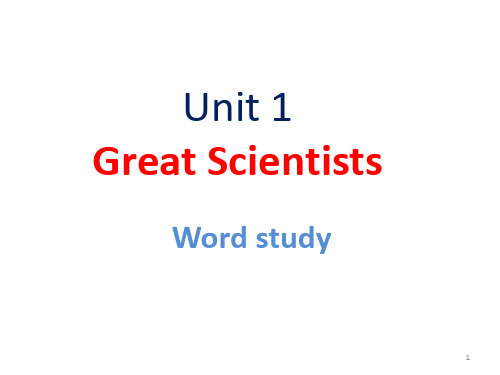
science (n)
4.构词
_s_c_ie_n_t_i_st______(n) 科学家
__sc_i_e_n_t_if_ic______(adj) 科学的
5.conclude ---reach a decision or judgement得出结论 ---(cause …to )come to an end结束
3
2 painter (n)油漆工;画家 paint (v)画画;给…油漆/U油漆;涂料 painting (U)/(C)
Ex3. My hobby is _p_a_in__ti_n_g___ and I like these _p_a_i_n_t_in_g_s____. May I know who is the _p_a_i_n_te_r___?
19
14. suspect
n. The police have arrested two suspects.
be suspicious (adj) of/ about
15. severe (adj)
causing serious harm, pain ,worry or discomfort
21
16. foresee
to see or form an idea about what is going to happen in the future in advance foresee __fo_r_e_s_a_w___ _f_o_re_s_e_e_n___
近义词
forecast forecast forecast
expose… to…
10
be exposed to … exposure (n)
Ex1. 留在屋里,不要让皮肤在阳光下暴晒。
人教版高中英语必修五《Unit 1 Great scientists 》 Listening and writing 课件

Language points:
1. revolution & revolutionary
Read through the passage, and tell whether the following statements are true or false.
1. At Copernicus’ time, Christian Church was in charge of many western countries. T
4. His friends were not interested in his ideas. F
5. Since he was not afraid of being attacked by the Church, Copernicus published his book as soon as he finished working on it. F
Unit 1 Great scientists Listening and writing 课件
Listening
Qian Xuesen, who has made great contributions to the development of China’s space industry, is one of the best-known scientists in China. His work has been very important for the development of China.
人教版高中英语必修五第一单元重点句子Unit1Greatscientists
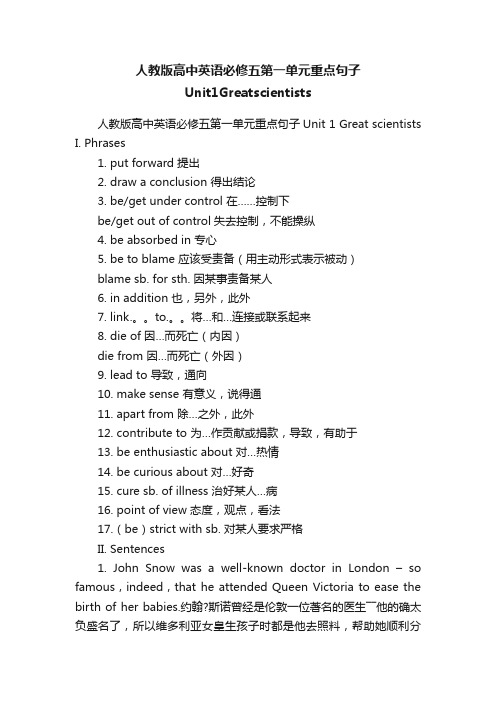
人教版高中英语必修五第一单元重点句子Unit1Greatscientists人教版高中英语必修五第一单元重点句子Unit 1 Great scientistsI. Phrases1. put forward 提出2. draw a conclusion 得出结论3. be/get under control 在……控制下be/get out of control失去控制,不能操纵4. be absorbed in 专心5. be to blame 应该受责备(用主动形式表示被动)blame sb. for sth. 因某事责备某人6. in addition 也,另外,此外7. link.。
to.。
将…和…连接或联系起来8. die of 因…而死亡(内因)die from 因…而死亡(外因)9. lead to 导致,通向10. make sense 有意义,说得通11. apart from 除…之外,此外12. contribute to 为…作贡献或捐款,导致,有助于13. be enthusiastic about 对…热情14. be curious about 对…好奇15. cure sb. of illness 治好某人…病16. point of view 态度,观点,看法17.(be)strict with sb. 对某人要求严格II. Sentences1. John Snow was a well-known doctor in London –so famous,indeed,that he attended Queen Victoria to ease the birth of her babies.约翰?斯诺曾经是伦敦一位著名的医生――他的确太负盛名了,所以维多利亚女皇生孩子时都是他去照料,帮助她顺利分娩。
2. But he became inspired when he thought about helping ordinary people exposed to cholera.但当他一想到要帮助患病的普通老百姓,特别是那些得了霍乱的患者时,他就感到很振奋。
人教版高中英语必修五 Unit 1 Great Scientists words learning 本人原创课件( 共14张)
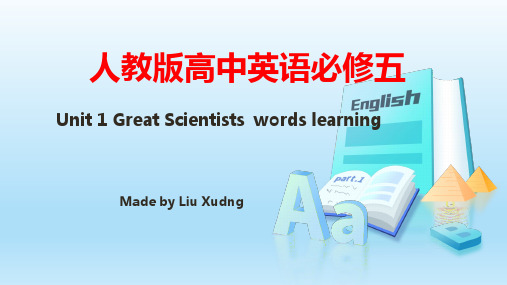
It was just after sunrise on a June morning. “Nicolo,” whose real name cannot be ___41___ to the public because of Italy’s privacy laws, ___42___ working
conclude conclusion decide
decision
Compound break ward
Conversion suspect vt.认为;怀疑 n 被怀疑者;嫌疑犯 expert adj 熟练的;经验丰富的 n.专家;行家
词义匹配
challenge to win a victory over someone
physician something that tests strength, skill or ability
联想扩展
1.反义词联想
certainty uncertainty responsible irresponsible infect disinfect cautious careless reject accept
the whole night at a factory in Turin.
41. A. attached C. exposed
42. A. finished C. considered
B. allocated D. submitted B. delayed D. tried
NMET2020 NATION 2 CLOZE
高考链接
It’s about the now and what one contributes to the now, because reading is a give and take between author and reader. (NMET2020 NATION 1)
高中英语Unit1 Great scientists文章 John Snow人教版必修五

John SnowJohn Snow, a creative London physician, achieved prominence in the mid-nineteenth century as an obstetrician who was among the first to use anesthesia. It was his work in epidemiology, however, which earned him his position as a prototype.During the 1830s and 1840s, when severe cholera epidemics threatened London, Dr. Snow had bee interested in the cause and transmission of the disease. In 1849, he published a brief pamphlet, On the Mode of munication of Cholera, suggesting that cholera is a contagious disease caused by a poison that reproduces in the human body and is found in the vomitus and stools of cholera patients. He believed that the main, although not only, means of transmission was water contaminated with this poison. This differed from a monly-held theory that diseases were transmitted by inhalation of vapors. The pamphlet caused no great stir, and Dr. Snow's argument was only one of many hopeful theories proposed during a time when cholera was causing great distress.Dr. Snow was able to prove his theory in 1854, when another severe epidemic of cholera occurred in London. Through painstaking documentation of cholera cases and correlation of the parative incidence of cholera among subscribers to the city's two water panies, he showed that cholera occurred much more frequently in customers of one water pany, the Southwark and Vauxhall. This pany drew its water from the lower Thames, where it had bee contaminated with London sewage, whereas the other pany obtained water from the upper Thames. Dr. Snow's evidence soon gained many converts.。
必修5-人教版高中英语课文原文和翻译
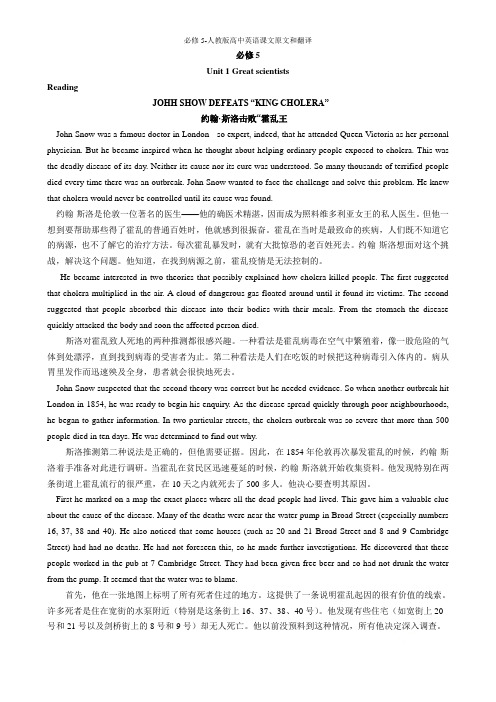
必修5Unit 1 Great scientistsReadingJOHH SHOW DEFEATS “KING CHOLERA”约翰·斯洛击败“霍乱王John Snow was a famous doctor in London - so expert, indeed, that he attended Queen Victoria as her personal physician. But he became inspired when he thought about helping ordinary people exposed to cholera. This was the deadly disease of its day. Neither its cause nor its cure was understood. So many thousands of terrified people died every time there was an outbreak. John Snow wanted to face the challenge and solve this problem. He knew that cholera would never be controlled until its cause was found.约翰·斯洛是伦敦一位著名的医生——他的确医术精湛,因而成为照料维多利亚女王的私人医生。
但他一想到要帮助那些得了霍乱的普通百姓时,他就感到很振奋。
霍乱在当时是最致命的疾病,人们既不知道它的病源,也不了解它的治疗方法。
每次霍乱暴发时,就有大批惊恐的老百姓死去。
约翰·斯洛想面对这个挑战,解决这个问题。
他知道,在找到病源之前,霍乱疫情是无法控制的。
He became interested in two theories that possibly explained how cholera killed people. The first suggested that cholera multiplied in the air. A cloud of dangerous gas floated around until it found its victims. The second suggested that people absorbed this disease into their bodies with their meals. From the stomach the disease quickly attacked the body and soon the affected person died.斯洛对霍乱致人死地的两种推测都很感兴趣。
人教版高中英语必修五Unit 1《Great scientists》word教案1
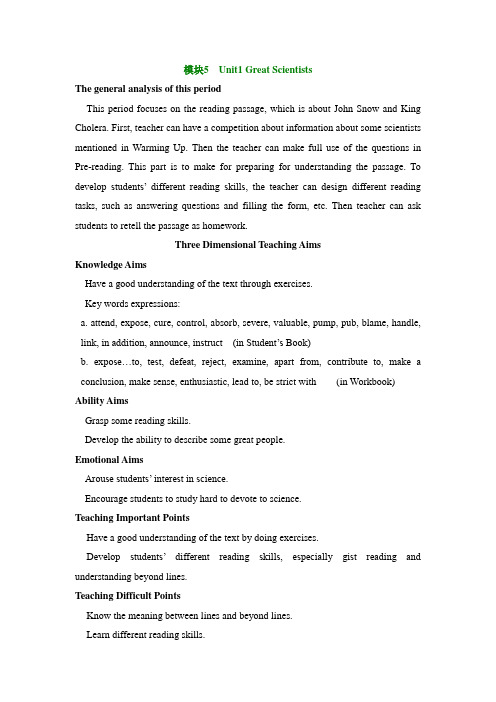
模块5 Unit1 Great ScientistsThe general analysis of this periodThis period focuses on the reading passage, which is about John Snow and King Cholera. First, teacher can have a competition about information about some scientists mentioned in Warming Up. Then the teacher can make full use of the questions in Pre-reading. This part is to make for preparing for understanding the passage. To develop students’ different reading skills, the teacher can design different reading tasks, such as answering questions and filling the form, etc. Then teacher can ask students to retell the passage as homework.Three Dimensional Teaching AimsKnowledge AimsHave a good understanding of the text through exercises.Key words expressions:a. attend, expose, cure, control, absorb, severe, valuable, pump, pub, blame, handle, link, in addition, announce, instruct (in Student’s Book)b. expose…to, test, defeat, reject, examine, apart from, contribute to, make a conclusion, make sense, enthusiastic, lead to, be strict with (in Workbook) Ability AimsGrasp some reading skills.Develop the ability to describe some great people.Emotional AimsArouse students’ interest in science.Encourage students to study hard to devote to science.Teaching Important PointsHave a good understanding of the text by doing exercises.Develop students’ different reading skills, especially gist reading and understanding beyond lines.Teaching Difficult PointsKnow the meaning between lines and beyond lines.Learn different reading skills.Teaching AidsMulti-media classroom and other normal teaching tools.Teaching ProcedureStep 1 GreetingGreet students as usual.Step 2 Warming up1. (Pair work) what five most important qualities do you think a scientist shouldhave? Give reasons.clever/talented strict patient creative confident bravedetermined/strong-willed positive honest energeticintelligent/hard-working ambitious careful co-operative2. (Group work) Ex2, p1Do you know how to prove a new idea in scientific research? Discuss in groups the stages in examining a new scientific idea. What order would you put them in?Draw a conclusion Think of a method Collect results Make up a question Find a problem Analyze the results Repeat if necessaryStep 3 pre-reading1. Invite 2-3 Ss to introduce the scientists they admire most to the class2. Background introduction to John SnowJohn Snow (1813-1858) was born and worked as a doctor in Great Britain. He was originally an anesthetist(麻醉师).He was so famous that he became the doctor for Queen Victoria at the births of her many children.Four outbreaks of cholera in the 1830s and 1840s killed many people in England. In 1854, the most terrible outbreak of cholera which ever occurred in the kingdom began. It was so violent and sudden that 127people died in the first three days.1. Give information of the deadly disease cholera1) What infectious diseases do you know? (AIDS, SARS, H5N1,pig-borne disease 猪链球菌)2) What kind of disease is it ?Name of choleraSymptom(症状)severe vomit (呕吐) and diarrhoea (腹泻)Aftereffect die quickly from a loss of liquid4. Make up a questionWhat was the cause of this disease? How did John Snow find it out?Get Ss to imagine and describe How John Snow defeat cholera by making use of the key wordsCholera, outbreak, severe, deadly, infectious, examine, expose, analyze, control, cure, defeat5. New WordsWork in pairs and match the words with their definitions.A. attendB. controlC. handleD. blameE. absorbF. announceG. immediatelyH. be linked toI. in addition G. expose 1. have control, authority, power over2. part of a tool, bucket, etc. by which it may be held in thehand3. take or suck in4. at once or without delay5. uncover, leave uncovered or unprotected6. as well, besides7. be joined with, be connected with8. wait on, serve, look after9. fix on sb, the responsibility for sth done or not done10. make knownSuggested answer:B-1 C-2 E-3 G-4 j-5 I-6 H-7 A-8 D-9 F-10 Step 4 Reading1. Fast reading : ScanningScan the passage and find out what are mentioned in the passage.1) John Snow’s wish2) John Snow’s attendin g Queen Victoria3) Two theories explaining the cause of Cholera4) John Snow’s examination of the source of the water5) Evidence for the cause of Cholera6) The source of all water supplies7) The spread of Cholera by germs in polluted waterSuggested answer: 1), 3),4), 5),7)2. Second reading : SkimmingRead the text quickly and find out the main idea of each paragraphPara 1: the problem Para 2: the cause----two theories Para 3: the method Para 4: the discovery Para 5: the result andconclusion Para 6: the suggestion3. Careful reading: Read the text carefully and answer the following questions.1) What problem existed in London at his time?2) How did Cholera killed people?3) How did he prove the second theory was correct?4) What was the result after he looked into the cause of Cholera?5) Which idea was right? Why?6) What conclusion did he draw?Step 5 Discussion1.(Group work) Discuss how John Snow investigates cholera. Put the stages in examing the disease in the right order.Draw a conclusion Think of a method Collect results Make up a questionFind a problem Analyze the results Repeat if necessaryP3, Ex2, and Q3: Do you think John Snow would have solved this problem without the map? Give your reasons.make up one’s mind, make sure, make room for)2. Find out the phrases according to the Chinese (part 1 on the paper for languagepoints)3. Retell the story John Snow Defeats “King Cholera” by following the 7 steps on p14. Read notes to Unit 1, p78-79, find out some difficult points while reading the text。
人教版高中英语必修五Unit1GreatScientistsnewwords课件
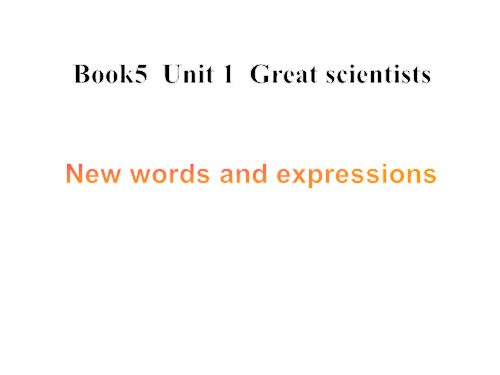
得出结论 使显露;暴露 将…和…连接起来 吸取
5.cure 既可作名词,也可作动词。 e.g. Her cure took six weeks. There is no certain cure for this disease.
cure作名词时,意为“治愈,痊愈”;也可意为
“药,药物,疗法”,常与介词__f_o_r__连用。
This medicine should cure you of your cold.
cure作动词时,意为“治愈,治好(病人或动物)”,
常构成搭配___c_u_r_e_s_b__. _o_f_s;th. Many types of cancer can now be cured. cure也可意为“治好(疾病)”。
给出cure的中文含义。
v. 治愈
v. 治疗
* When you have a pain in your shoulders, you
link … to … 将…和……联系或连接起来
4. Researchers have detected a link between smoking and heart disease. n. 关系
10. announce
e.g. They have announced the date of their wedding in the newspaper.
We concluded not to go. 我们决定不去。
conclusion n 意为“结束,结论” 得出结论 reach/make/draw/arrive at/come to a conclusion in conclusion 最后,总之
3.选择attend在句中的含义。 a. 出席,参加 b. 照料,护理
人教版必修五Unit1 Great Scientists Word study
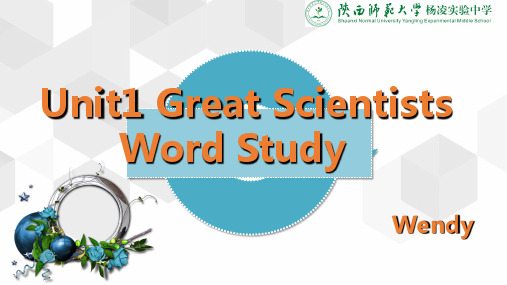
n. 治愈,治疗方法 a cure for sth.治疗……的方法
Is there a certain cure for cancer yet?
14
Word study
Part four Consolidation
将下列句子翻译成汉语。
1.他朗诵一首诗结束了他的演讲。
conclude/end...with
【My notes】 1. conclude (sth.) w__it_h___sth. 以…结束
_f_r_o_m__ sth. 从…推断出… 2. ___co_n__cl_u_s_io_n____ n. 结论;推论 _____a_rr_i_v_e_a_t_/_re_a_c_h_/_c_o_m_e__to_/_d_r_a_w__a_c_o_n_c_l_u_s_io_n_________得出结论 ____i_n___ conclusion = ___to___ __c_o_n_c_lu_d_e_( conclude) 总之;最后
【My notes】
1. absorb..._f_r_o_m__... 从...中吸收… 2. ____a_b_s_o_rb__ed___ adj. 全神贯注的
____a_b_s_o_r_b_i_n_g__ adj. 十分吸引人的 3. be absorbed ___b_y_/_in_t_o__ 被…吞并/吸收 4. be _a_b_s_o_r_b_e_d(absorb) __in___ __d_o_in_g_(do) 全神贯注于(做)某事
(3) The __b_r_ig_h_t__ man paid special__a_tt_e_n_t_io_n_ (attend) to the _b_r_i_g_h_tn_e_s_s_ of the stars . (bright)
- 1、下载文档前请自行甄别文档内容的完整性,平台不提供额外的编辑、内容补充、找答案等附加服务。
- 2、"仅部分预览"的文档,不可在线预览部分如存在完整性等问题,可反馈申请退款(可完整预览的文档不适用该条件!)。
- 3、如文档侵犯您的权益,请联系客服反馈,我们会尽快为您处理(人工客服工作时间:9:00-18:30)。
Unit1 Great scientists单元练习一、听力(听力)(共20小题;共20分)第一节(共5 小题;每小题1.5 分,满分7.5 分)听下面5段对话。
每段对话后有一个小题,从题中所给的A、B、C三个选项中选出最佳选项。
听完每段对话后,你都有10秒钟的时间来回答有关小题和阅读下一小题。
每段对话仅读一遍。
1. Where does the conversation probably take place?A. At a restaurant.B. At the doctor's.C. In a coffee shop.2. What time is it now?A. 9:15 p.m.B. 9:30 p.m.C. 9:45 p.m.3. Why can't the woman meet the man this evening?A. The man will visit his friend.B. She will go to visit her friend.C. Her friend will come to see her.4. What does Billy mean?A. His brother never forgets his own birthday.B. His brother will give him a birthday present.C. His brother is coming to celebrate his birthday.5. What does the woman suggest the man do?A. Order a new book.B. Read another book.C. Search the shelf again.第二节(共15小题;每小题1.5分,满分22.5分)听下面5段对话或独白。
每段对话或独白后有几个小题,从题中所给的A、B、C三个选项中选出最佳选项。
听每段对话或独白前,你将有时间阅读各个小题,每小题5秒钟;听完后,各小题将给出5秒钟的作答时间。
每段对话或独白读两遍。
听第6段材料,回答第6、7题。
6. What is the attitude of the man towards the woman?A. Cold.B. Rude.C. Considerate.7. How much is the calculator?A. 9 dollars.B. 19 dollars.C. 90 dollars.听第7段材料,回答第8、9题。
8. Where is the woman?A. In a hotel.B. In a company.C. In a travel agency.9. What are the two speakers talking about?A. The man's hobby.B. Tour information.C. Hotel service. 听第8段材料,回答第10至12题。
10. Why is the man going to the States?A. To visit places of interest.B. To attend a conference.C. To visit his friends.11. What is the man most probably?A. A scientist.B. A reporter.C. A pilot.12. Who will pay the man's expenses?A. The man himself.B. A California official.C. The University of Stanford.听第9段材料,回答第13至16题。
13. What field of job does the woman want to do after graduation?A. Law.B. Medicine.C. Management.14. What does the woman think is the key to one's success?A. Education background.B. Working experience.C. Interest.15. What does the man's father want him to be?A. A doctor.B. A teacher.C. A businessman.16. What can we learn about the man?A. He hasn't found a job up to now.B. He has no ambition and feels down.C. He will accept his father's suggestion.听第10段材料,回答第17至20题。
17. Where did Mary work as a waitress?A. At a top club in Britain.B. At a club named Top Club.C. At a club at New York University.18. How did Mary describe Mr. Williams?A. Nice.B. Careless.C. Humorous.19. Why did the club pay Mary the money?A. She worked hard for the club.B. Her story made the club well known.C. Mr. Williams asked the boss of the club to do so.20. What is the story mainly about?A. A generous customer.B. The biggest tip in the history.C. An unexpected amount of money.二、单词拼写(单句首字母填空)(共15小题;共15分)21. From his appearance, we may c that he is a heavy smoker.22. Our school football team d the Sunshine School team in the match.23. Sorry, Mr. Smith has an important meeting to a right now. Shall I ask him to call back an hour later?24. Being e to the sun is harmful to your skin.25. With better understanding of the human body, scientists and physicians will be able toc more diseases.26. Perhaps the most difficult c is how to survive without friends.27. No one knows who killed her, but the police s her husband.28. You are to b for the broken glass.29. He found that it came from the river p by the dirty water from London.30. If you can't h the job, I will get someone else to do it.31. Warm sunshine a the coming of spring.32. We should c ourselves to the motherland.33. It was hard for me to r my family's religious belief.34. You need to sit down and a why you feel so upset.35. We can plant more trees because trees a carbon dioxide in the air to produce oxygen.三、单词拼写(根据中文提示拼写单词)(共15小题;共15分)36. When (参加) networking events, ask others what they do and think about how you can help them.37. This (嫌疑犯) comes under observation.38. She (露出) a set of perfect white teeth when she smiles.39. It is a great (挑战) for him to govern the country well.40. The meeting will probably (结束) without any solutions to this problem.41. You must be (谨慎的) about strangers.42. To our surprise, the old doctor (治愈) my cousin of her cancer.43. If you fail in the exam, you'll only have yourself to (责备).44. He found that the water came from the river (污染) by the dirty water from London.45. The coach tried to (分析) the cause of our defeat.46. We are sure that our class basketball team will (打败) any other one in the coming sports meeting.47. I believe that each of us can (为...做贡献) to the future of the world.48. It's necessary for young people to learn to (处理) stress.49. Warm sunshine (预告,宣告) the coming of spring.50. She is kind-hearted. You shouldn't (拒绝) her offer.四、翻译(根据中文提示完成句子)(共10小题;共20分)51. 这个问题一被提出来,大家就纷纷站起来发表自己的观点。
